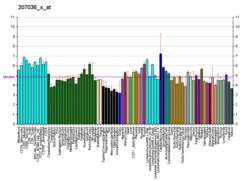GRIN2D
Glutamate [NMDA] receptor subunit epsilon-4 is a protein that in humans is encoded by the GRIN2D gene.
N-methyl-D-aspartate (NMDA) receptors are a class of ionotropic glutamate receptors. NMDA channel has been shown to be involved in long-term potentiation, an activity-dependent increase in the efficiency of synaptic transmission thought to underlie certain kinds of memory and learning. NMDA receptor channels are heteromers composed of the key receptor subunit NMDAR1 (GRIN1) and 1 or more of the 4 NMDAR2 subunits: NMDAR2A (GRIN2A), NMDAR2B (GRIN2B), NMDAR2C (GRIN2C), and NMDAR2D (GRIN2D).
GRIN2D has been shown to interact with Interleukin 16.
This article incorporates text from the United States National Library of Medicine, which is in the public domain.
...
Wikipedia

